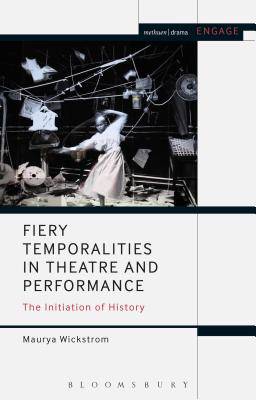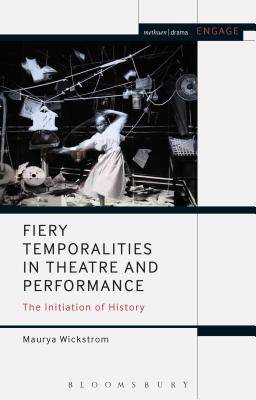
Je cadeautjes zeker op tijd in huis hebben voor de feestdagen? Kom langs in onze winkels en vind het perfecte geschenk!
- Afhalen na 1 uur in een winkel met voorraad
- Gratis thuislevering in België vanaf € 30
- Ruim aanbod met 7 miljoen producten
Je cadeautjes zeker op tijd in huis hebben voor de feestdagen? Kom langs in onze winkels en vind het perfecte geschenk!
- Afhalen na 1 uur in een winkel met voorraad
- Gratis thuislevering in België vanaf € 30
- Ruim aanbod met 7 miljoen producten
Zoeken
€ 79,95
+ 159 punten
Uitvoering
Omschrijving
Fiery Temporalities in Theatre and Performance: The Initiation of History takes up the urgent need to think about temporality and its relationship to history in new ways, focusing on theatre and performance as mediums through which politically innovative temporalities, divorced from historical processionism and the future, are inaugurated. Wickstrom is guided by three temporal concepts: the new present, the penultimate, and kairos, as developed by Alain Badiou, Giorgio Agamben, and Antonio Negri respectively. She works across a field of performance that includes play texts by Aimé Césaire and C.L.R. James, and performances from Ni'Ja Whitson to Cassils, the Gob Squad to William Kentridge and African colonial revolts, Hofesh Schechter to Forced Entertainment to Andrew Schneider and Omar Rajeh. Along the way she also engages with Walter Benjamin, black international and radical thought and performance, Bruno Latour, Stefano Harney and Fred Moten's logistics and the hold, and accelerationism.
Representing a significant contribution to the growing interest in temporality in Theatre and Performance Studies, the book offers alternatives to what have been prevailing temporal preoccupations in those fields. Countering investments in phenomenology, finitude, ghosting, repetition, and return, Wickstrom argues that theatre and performance can create a fiery sense of how to change time and thereby nominate a new possibility for what it means to live.
Representing a significant contribution to the growing interest in temporality in Theatre and Performance Studies, the book offers alternatives to what have been prevailing temporal preoccupations in those fields. Countering investments in phenomenology, finitude, ghosting, repetition, and return, Wickstrom argues that theatre and performance can create a fiery sense of how to change time and thereby nominate a new possibility for what it means to live.
Specificaties
Betrokkenen
- Auteur(s):
- Uitgeverij:
Inhoud
- Aantal bladzijden:
- 264
- Taal:
- Engels
- Reeks:
Eigenschappen
- Productcode (EAN):
- 9781350143296
- Verschijningsdatum:
- 26/12/2019
- Uitvoering:
- Paperback
- Formaat:
- Trade paperback (VS)
- Afmetingen:
- 140 mm x 216 mm
- Gewicht:
- 303 g

Alleen bij Standaard Boekhandel
+ 159 punten op je klantenkaart van Standaard Boekhandel
Beoordelingen
We publiceren alleen reviews die voldoen aan de voorwaarden voor reviews. Bekijk onze voorwaarden voor reviews.









